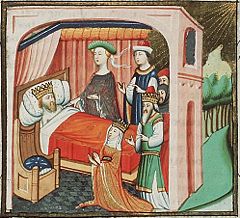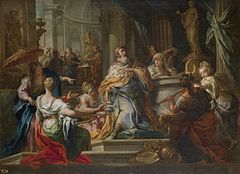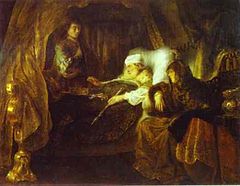 The book of 1 Kings is an intriguing amalgam of various strands of tales concerning Solomon, third king of Israel, and his immediate heirs, whose gross misrule led to the division of the nation of Israel into northern and southern pieces. It begins with the tragic and frankly despicable end of David’s reign and life, involving his squalid requests for revenge against some of his old enemies, involving his son, Solomon, in the sordid murders that follow (1 Kings 1-2). Then we read a treacly pious prayer of the new king (1 Kings 3:1-15), asking YHWH for wisdom only, a prayer that triggers from YHWH not only the requested wisdom, but also riches and fame to boot. What more could a king dream of? Then, as a sign of that God-given wisdom, Solomon makes a judgment between two women concerning a child, determining that the child belonged to the one that was willing to give it up, rather than to the one who was more than willing to allow the child to be cut in two to solve the problem equitably, however bloodily (1 Kings 3:16-27). “All Israel heard of the judgment that the king had made; and they were in awe of the king, because they discerned that the wisdom of God was in him to execute justice” (1 Kings 3:28). It hardly takes any God-given wisdom on the part of a modern reader to discern that whoever wrote 1 Kings 3 was an avowed propagandist for the new king.
The book of 1 Kings is an intriguing amalgam of various strands of tales concerning Solomon, third king of Israel, and his immediate heirs, whose gross misrule led to the division of the nation of Israel into northern and southern pieces. It begins with the tragic and frankly despicable end of David’s reign and life, involving his squalid requests for revenge against some of his old enemies, involving his son, Solomon, in the sordid murders that follow (1 Kings 1-2). Then we read a treacly pious prayer of the new king (1 Kings 3:1-15), asking YHWH for wisdom only, a prayer that triggers from YHWH not only the requested wisdom, but also riches and fame to boot. What more could a king dream of? Then, as a sign of that God-given wisdom, Solomon makes a judgment between two women concerning a child, determining that the child belonged to the one that was willing to give it up, rather than to the one who was more than willing to allow the child to be cut in two to solve the problem equitably, however bloodily (1 Kings 3:16-27). “All Israel heard of the judgment that the king had made; and they were in awe of the king, because they discerned that the wisdom of God was in him to execute justice” (1 Kings 3:28). It hardly takes any God-given wisdom on the part of a modern reader to discern that whoever wrote 1 Kings 3 was an avowed propagandist for the new king.
Then in 1 Kings 4, we hear of many exact details concerning Solomon’s complex administration which announces his magnificence as king. Chapters 5-7 turn to Solomon’s most memorable deed, the construction of the temple in Jerusalem, a shrine that will grace the skyline of the holy city for the next 350 years. We are told how Hiram of Tyre provided the needed large trees from the fabled forests of Lebanon, and how Solomon arranged a veritable horde of forced laborers (“numbering 30,000”), who were commanded to spend one month in Lebanon and two months at home. In addition, it is said that Solomon had “70,000 laborers and 80,000 stone cutters in the hill country,” all directed by 3300 “supervisors who were over the work” (1 Kings 5:13-16). By any reckoning, this is a huge work force, employing a large percentage of the population of the nation, all designed to build a magnificent house for YHWH. Ironically, the resulting building, not very imposing by Middle Eastern standards, only some 150 feet long by 50 feet wide by 30 feet high, to use approximate modern measurements, led directly to the anger and discomfort of many Israelites, who later, led by a former building foreman, Jereboam, broke away from Jerusalem in rebellion and formed their own northern kingdom that they named Israel, leaving only a severely weakened and truncated Judah behind. The temple may have been constructed as a unifying structure for the people, but it led instead to rebellion and division among them.
Nevertheless, the Solomonic propagandist is still at work in today’s text. When the construction of the temple is complete, Solomon first reclaims the sacred Ark of the Covenant, that holy chest that his father David had installed in a tent in Jerusalem as a part of his unifying actions upon his becoming king of the entire land (2 Sam.6). In a similar fashion, Solomon has the Ark brought to the “inner sanctuary of the house, in the most holy place” (1 Kings 8:6). The Ark is now seen to be so sacred that it is never to be viewed by the common people, but is only now available to the most holy men who oversee the daily work of the temple. In an odd, but perhaps revealing detail, “The poles (that are used to carry the Ark) were so long that the ends of the poles were seen from the holy place in front of the inner sanctuary; but they could not be seen from outside; they are there to this day” (1 Kings 8:8). Take our word for it, say the authors, the Ark and its overly long poles remain in their assigned places even now, making it plain that, though you common folk will never lay eyes on it, it really is there! Propagandists always want to demonstrate their superior and inside knowledge to suggest that they in fact know precisely what they are taking about!
Once the Ark is duly ensconced in its private chamber, Solomon gives a speech to the assembled “elders of Israel, all the heads of the tribes, the leaders of the ancestral houses of the Israelites” (1 Kings 8:1), in other words anyone who was anyone in the kingdom. The speech is predictable, blessing YHWH for bringing Israel out of Egypt, choosing the faultless David as king who hoped to build this house, but instead it fell to his son and heir to do the building. “Now YHWH has fulfilled the promise made; for I have risen in the place of any father David; I sit on the throne of Israel, as YHWH promised, and I have built the house for YHWH, God of Israel” (1 Kings 8:20). Note the repeated first person pronouns; Solomon is the promised one of YHWH, and he has completed the temple for YHWH, just as YHWH promised that he would. No one can miss the complete intermingling of church and state in the speech; YHWH is God and Solomon is YHWH’s king, as anyone with eyes in her head can see. 
And the following prayer doubles down on the certainty of Solomon’s kingship. It is important to remember, as we read this prayer, just how Solomon came to be king, instead of any one of the older sons of David. He was of course the child of David and Bathsheba, the replacement offspring of the first child of the adultery who died. And he was clearly the favorite of the court prophet, Nathan, that insider who knew all there was to know about the faults of David. Bathsheba and Nathan conspired to convince a freezing and dying David to make Solomon king, telling him that he in fact had promised to do so. There is no evidence that David ever promised such a thing, but he does it anyway. It is Solomon who rides the king’s mule, and not Adonijah or any other of David’s possible heirs. And we have seen how Solomon, under David’s severe tutelage, secured his throne by murdering several possible claimants. In the dedicatory prayer, Solomon is careful to remind YHWH of the covenant made with David, that particular promise: “there shall never fail you a successor before me to sit on the throne of Israel, if only your children look to their way, to walk before me as you have walked before me” (1 Kings 8:25—see 2 Sam.7). “Therefore, O God of Israel, let your word be confirmed, which you promised to your servant my father David” (1 Kings 8:26).
The prayer includes a long litany of sins that Solomon recounts as a symbol that YHWH is indeed a God of righteous acts, one who punishes evil and rewards good deeds. He includes sins against neighbors (1 Kings 8:31-32); sins leading to military defeat (1 Kings 8:33-34); sins leading to drought (1 Kings 8:35-36); sins leading to famine (1 Kings 8:37-40). He then adds a request that any foreigner who comes to the temple to pray might have that prayer heard and answered, “so that all the peoples of the earth may know your name, may worship you, as do your people Israel” (1 Kings 8:43).
The prayer is followed by a blessing on those who have come to the dedication (1 Kings 8:54-61), capped off by an enormous sacrifice of beasts: 22,000 oxen and 120,000 sheep. The numbers are of course ludicrous, but the propagandistic point has been made: Solomon truly is king, heir to David, and the greatest and most pious monarch that Israel has seen and is ever likely to see. Unfortunately, in 1 Kings 11 an aging King Solomon, now the leader of an expanding empire along with a vast harem, allows himself to be led astray to other gods by some of these women, acts that in turn lead to dismay and confusion among the people. In addition, several smaller rebellions are described against the king, Hadad the Edomite and Rezon, king of Aram. But these are merely prelude to the huge revolt against Solomon led by Jereboam and completed after the king’s death.
Just what are we to make of all this obvious propaganda? However much leaders attempt to cover over their weaknesses and grabs for power, they finally are snared in their own clever traps. The “wisdom of Solomon” turns out to be a spider’s web, a tissue of weak threads that all too easily collapse into confusion and disappointment. The tales of Solomon repeat that central Bible claim that all people, no matter how great, no matter how vaunted, are finally all too human, so human that only God can at the last find use for them. No propagandist, no matter how skilled, no matter how deft, can disguise the humanity of the object of his awe. That is true of David; it is true of Solomon; it is true of you and me.
(Images from Wikimedia Commons)











